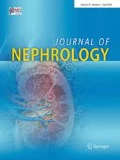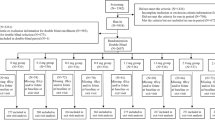Abstract
Background
Hyperhomocysteinaemia, an independent risk factor for cardiovascular diseases, is common in hemodialysis patients (HD) and particularly in those homozygous for polymorphism of the 5,10‐methylenetetrahydrofolate reductase (MTHFR) gene. B vitamins supplementation has been shown to lower plasma total homocysteine (tHcy), but this has been contreversed in several groups. The aim of our study was to explore the response of tHcy in hemodialysis (HD) patients to individual supplementation with folic acid (B9) and/or vitamin B12, based on carrier status for the (MTHFR) polymorphism.
Methods
132HD were randomized according to C677TMTHFR genotypes into 2 groups (AandB). The group (A) was treated initially with B9 (10mg/day orally) for 2 months (t1) and then with B12 vitamin (cyanocobalamin ampoule of 1000 μg) for the following 2 months (t2), then association of B9 and B12 for 2 months (t3). The group (B) was supplemented initially with vitamin B12 (t1), then with folic acid (t2) and then B9 + B12 for 2 months (t3). A wash-out period of 2 months followed the treatment in both groups (t4). We determined tHcy, B9 and B12 concentrations at each time.
Results
In group A, we noted that the decrease in tHcy becomes significant for CC when patients were supplemented with vit B12 only (p = 0.009). While, B9 + vit B12 supplementation did not seem to improve a significant effect compared with B12 alone. For genotypes (CT) and (TT) we noticed a significant decrease in tHcy at t1 (p = 0.038; 0.005 respectively) and at (t3; CT p = 0.024; TT p = 0.017). In group B, for genotypes CC, the decrease in tHcy became significant at t3 (vit B12 + B9; p = 0.031). For genotypes (CT) and (TT), at the replacement of vit B12 by B9, tHcy was significantly decreased (p = 0.036; 0.012, respectively). The combination of the 2 vitamins (t3) showed no difference compared to folate alone. In the 2 groups (t4), there was an significant increase of tHcy again for 3 genotypes.
Conclusion
Supplementation with B vitamins correlated to the MTHFR genotypes has been shown to lower significantly tHcy in HD patients.



Similar content being viewed by others
References
Chao MC, Hu SL, Hsu HS, Davidson LE, Lin CH et al (2014) Serum homocysteine level is positively associated with chronic kidney disease in a Taiwan Chinese population. J Nephrol 27(3):299–305
Sen U1, Mishra PK, Tyagi N, Tyagi SC (2010) Homocysteine to hydrogen sulfide or hypertension. Cell Biochem Biophys 57(2–3):49–58
Foley RN, Parfrey PS, Samak MJ (1998) Clinical epidemiology of cardiovascular disease in chronic renal disease. Am J Kidney Dis 32(5 Suppl 3):S112
Brattstrom L, Wilcken DEL (1998) O¨ hrvik J and Brudin L. Common methylentetrahydrofolate reductase gene mutation leads to Hyperhomocysteinemia but not to vascular disease: the result of a meta-analysis. Circulation 98:2520–2526
Födinger M, Mannhalter C, Wölfl G, Pabinger I, Muller E, Schmid R et al (1997) Mutation (677 C to T) in the methylentetrahydrofolate reductase gene aggravates hyperhomocysteinemia in hemodialysis patients. Kidney Int 52:517–523
Bostom AG, Shemin D, Lapane KL et al (1996) High-dose-B-vitamin treatment of hyperhomocysteinemia in dialysis patients. Kidney Int 49:147–152
Billion S, Tribout B, Cadet E, Queinnec C, Rochette J, Wheatley P et al (2002) Hyperhomocysteinaemia, folate, and vitamin B12 in unsupplemented haemodialysis patients: effect of oral therapy with folic acid and vitamin B12. Nephrol Dial Transplant 17:455–461
Nair AP, Nemirovsky D, Kim M et al (2005) Elevated homocysteine levels in patients with end-stage renal disease. Mt Sinai J Med 72(6):365–373
Righetti M (2007) Homocysteine-lowering vitamin B treatment decreases cardiovascular events in hemodialysis patients. Clin Chem Lab Med 45:1586–1589
Righetti M, Ferrario GM, Milani S et al (2003) effects of folic acid treatment on homocysteine levels and vascular disease in hemodialysis patients. Med Sci Monit 9:137–142
Suliman ME, Stenvinkel P, Heimburger O et al (2002) Plasma sulfur amino acids in relation to cardiovascular disease, nutritional status, and diabetes mellitus in patients with chronic renal failure at start of dialysis therapy. Am J Kidney Dis 40:480–488
Arnadottir M, Gudnason V, Hultberg B (2000) Treatment with different doses of folic acid in haemodialysis patients: effects on folate distribution and aminothiol concentrations. Nephrol Dial Transplant 15:524–528
Weisberg I, Tran P, Christensen B, Sibani S, Rozen R (1998) A second genetic polymorphism in methylenetetrahydrofolate reductase (MTHFR) associated with decreased enzyme activity. Mol Genet Metab 64:169–172
Sharp L, Little J (2004) Polymorphisms in genes involved in folate metabolism and colorectal neoplasia : a huge review. Am J Epidemiol 159:423–443
Belkahla R, Omezzine A, Kchok K, Rebhi L, Ben Hadj Mbarek I, Rejeb J et al (2008) Effect of polymorphisms on key enzymes in homocysteine metabolism, on plasma homocysteine level and on coronary artery-disease risk in a Tunisian population. Annales de Cardiologie et d’Angéiologie 5(4):219–224
BelhadjMbarek I, Omezzine A, Abroug S, Belkahla R, Rebhi L, Benrejeb N and al. Supplementation in vitamin B response correlated to C 677T MTHFR genotype in hemodialised children. Immuno-analyse et biologie spécialisée (2008)23:368-374
Perna AF, Lanza D, Sepe I, Conzo G, Altucci L, Ingrosso D (2013) Altered folate receptor 2 expression in uraemic patients on haemodialysis: implications for folate resistance. Nephrol Dial Transplant 28(5):1214–1224
Di Daniele N, Di Renzo L, Noce A, Lacopino L, Ferraro FM, Rizzo M et al (2014) Effects of Italian Mediterranean organic diet vs. low-protein diet in nephropathic patients according to MTHFR genotypes. J Nephrol 27(5):529–536
Yong H, Jianping L, Xianhui Q, Yining H, Xiaobin W, Rebecca F et al (2015) Efficacy of Folic Acid Therapy in Primary Prevention of Stroke Among Adults With Hypertension in China. Am Med Assoc 313:1325–1335
Bostom AG, Shemin D, Bagley P, Massy ZA, Zanabli A, Christopher K et al (2000) Controlled comparison of L-5-methyltetrahydrofolate versus folic acid for the treatment of hyperhomocysteinemia in hemodialysis patients. Circulation 101:2829–2832
Dierkes J, Domrose U, Ambrosch A, Schneede J, Guttormsen AB, Neumann KH et al (1999) Supplementation with vitamin B12 decreases homocystein and methylmalonic acid but also serum folate in patients with end stage renal disease. Metabolism 48:631–635
Pastore A, De Angelis S, Casciani S et al (2006) Effects of folic acid before and after vitamin B12 on plasma homocysteine concentrations in hemodialysis patients with known MTHFR genotypes. Clin Chem 52(1):145–148
Tremblay R, Bonnardeaux A, Geadah D et al (2000) Hyperhomocysteinemia in hemodialysis patients: effects of 12-month supplementation with hydrosoluble vitamins. Kidney Int 58:851–858
Obeid R, Kuhlmann MK (2005) Ko¨hler H, Herrmann W. Response of homocysteine, cystathionine, and methylmalonic acid to vitamin treatment in dialysis patients. Clin Chem 51:196–201
Malinow MR, Nieto FJ, Kruger WD, Duell PB, Hess DL, Gluckman RA, Block PC, Holzgang CR, Anderson PH, Seltzer D, Upson B, Lin QR (1997) The effects of folic acid supplementation on plasma total homocysteine are modulated by multivitamin use and methylenetetrahydrofolate reductase genotypes. Arterioscler Thromb Vasc Biol 17:1157–1162
Sunder-Plassmann G, Födinger M, Buchmayer H et al (2000) Effect of high dose folic acid therapy on hyperhomocysteinemia in hemodialysis patients: results of the Vienna multicenter study. J Am Soc Nephrol 11:1106–1116
Azadibakhsh N, Hosseini RS, Atabak S, Nateghiyan N, Golestan B, Rad AH (2009) Efficacy of folate and vitamin B12 in lowering homocysteine concentrations in hemodialysis patients. Saudi J Kidney Dis Trans 20(5):779–788
Loehrer FM, Haefeli WE, Angst CP et al (1996) Effect of methionine loading on 5 methyltetrahydrofolate, S-adenosylmethionine and Sadenosyl homocysteine in plasma of healthy humans. Clin Sci (Colch) 91:79–86
Mansoor MA, Kristensen O, Hervig T et al (1997) Low concentrations of folate in serum and erythrocytes of smokers. Clin Chem 43:2193–2194
Verhaar MC, Wever RM, Kastelein JJ, van Dam T, Koomans HA, Rabelink TJ (1998) 5-methyltetrahydrofolate, the active form of folic acid, restores endothelial function in familial hypercholesterolemia. Circulation 97(3):237–241
Perna AF, D’Aniello A, Lowenson JD, Clarke S, De Santo NG, Ingrosso D (1997) D-aspartate content of erythrocyte membrane proteins is decreased in uremia: implications for the repair of damaged proteins. J Am Soc Nephrol 8:95–104
Pietrzik K, Bailey L, Shane B (2010) Folic acid and l-5-Methyltetrahydrofolate. Clin Pharmacokinet 49(8):535–548
Litynski P, Loehrer F, Linder L et al (2002) Effect of low dose of 5-methyltetrahydrofolate and folic acid on plasma homocysteine in healthy subjects with or without the 677C-T polymorphism of methylenetetrahydrofolate reductase. Eur J Clin Invest 32:662–668
Fohr IP, Prinz-Langenohl R, Bronstrup A et al (2002) 5,10-Methylenetetrahydrofolate reductase genotype determines the plasma homocysteine-lowering effect of supplementation with 5-methyltetrahydrofolate or folic acid in healthy young women. Am J Clin Nutr 75(2):275–282
Author information
Authors and Affiliations
Corresponding author
Ethics declarations
Conflict of interest
The authors declare that they have no conflict of interest.
Ethical approval
The study was approved by the Hospital Medical Ethics Committee.
Informed consent
All patients involved in the study provided their consent.
Rights and permissions
About this article
Cite this article
Achour, O., Elmtaoua, S., Zellama, D. et al. The C677T MTHFR genotypes influence the efficacy of B9 and B12 vitamins supplementation to lowering plasma total homocysteine in hemodialysis. J Nephrol 29, 691–698 (2016). https://doi.org/10.1007/s40620-015-0235-8
Received:
Accepted:
Published:
Issue Date:
DOI: https://doi.org/10.1007/s40620-015-0235-8




